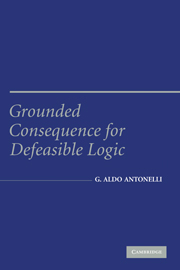4 - Defeasible Consequence Relations
Published online by Cambridge University Press: 18 July 2009
Summary
This chapter deals with the definition of a relation of defeasible consequence based on the notion of general extension introduced in Chap. 3, as well as some alternative developments. The basic notion of defeasible consequence is introduced in Section 4.1: The main result is that the relation so defined satisfies Gabbay's three desiderata (Theorem 4.1.6). Section 4.2 presents alternative developments, namely: (1) the important case of seminormal default theories (which turn out to have a unique minimal general extension); (2) defeasible consequence as based on extensions that are nonminimal (“optimal” in the sense of Manna and Shamir); and (3) a variant of general extensions that, at the cost of a slight complication, avoids certain somewhat counterintuitive results. In Section 4.3 we draw conclusions and comparisons to other approaches, and in Section 4.4 we sketch how to give a “transfinite” version of the present approach. Proofs of selected theorems can be found in Section 4.5.
DEFEASIBLE CONSEQUENCE
As we set out to define a relation of defeasible consequence, it will be convenient to introduce an abbreviated notation for extensions: We will use boldface uppercase Greek letters to stand for triples of sets of defaults, as in Γ = (Γ+, Γ−, Γ*). Similarly, given sequences of sets of defaults and we write Γn for If Γn is a sequence of sets of defaults (n ≤ 0), we write limGn for the unique Γ = (Γ+, Γ−, Γ*) such that Finally, to simplify notation still further, we write just W + ϕ in place of W ∪ {ϕ}.
Information
- Type
- Chapter
- Information
- Grounded Consequence for Defeasible Logic , pp. 86 - 112Publisher: Cambridge University PressPrint publication year: 2005
